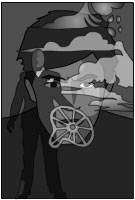Franz Kafka
Created | Updated Dec 19, 2014

Kafka is one of the most influential writers in the twentieth century, and is one of the many great minds to come from a German-speaking country.
A Brief Biography
Kafka was born in Prague Prague, Bohemia in 1883. On the surface it would seem that he led a very uninteresting life. He grew up in a German-speaking Jewish family. His father was very oppressive toward the young Kafka, and the future writer became increasingly more isolated from his childhood community. He did well in school and then later worked in an insurance company for many years. In 1917 he became ill with tuberculosis and lived in sanatoriums, and hospitals until 1924.
A New Genre
Kafka thought of writing as both a curse and a blessing. His works have been interpreted in many ways, and he has been compared to George Orwell, since some of their stories have similar themes. His prose explores the ideas of isolation, madness, and oppression. His works are part of the philosophical doctrine called existentialism. Existentialism is the idea that without the existence of God the individual must create all his own choices and have a God-like responsibility for his own life, or give control of his life to an earthly God-like authority. In one of his most acclaimed novels, The Trial, a man is arrested in the middle of the night by the government and sent to trial to face bureaucratic madness, in which he is never prosecuted, acquitted, or even told what crime he has committed. His strained relationship with his father may be reflected in the story called The Judgment, in which a son commits suicide as a result of his father’s accusations of bad character. There has even been a new word invented, Kafkaesque, to describe a thing with a maddening bizarre, irrational, or overly complex quality.
A Writer for Hard Times
Kafka wrote most of his literature during the time he was ill with tuberculosis. In the story called Metamorphosis, the protagonist wakes up one day to suddenly find that he has turned into a man-sized beetle and is confined to bed by his family. Perhaps it describes a little of how he might have felt as he sat alone in the sanatoriums. This was the period after the end of World War I and before the beginning of World War II. This was a generally depressing time, since the European economy as a whole suffered from war debts and a large part of the male population had been killed by the war. As a result, many artists lost faith in either their God or in the rationality of the universe. Along with existentialism, a creative movement named Dadaism was started. This can be loosely described as a philosophy in which the artist created chaotic and devastating art to reflect a chaotic and devastating world. It appears that some of Kafka’s work in this time converged with these cultural movements and was perhaps influenced by them, since Kafka kept company with some of the most prominent intellectual and literary figures of this era.
Is There at Least a Happy Ending?
Perhaps what is most interesting and sad about Kafka’s life is that he himself never became recognized until after his death. When he was alive only a few of his stories had been published, but none had reached fame. In his will he had ordered that all his manuscripts be destroyed and any future publication of the other stories in print to be halted. But Max Brod, a fellow novelist and good friend of Kafka, had the manuscripts published. Once titles like Metamorphosis, The Trial, and The Castle came into print the public began to discover the genius with which Kafka expressed the feelings of an era. He created an insane, convoluted world in his novels. During the time between the two World Wars, that was some people's view of the world.
